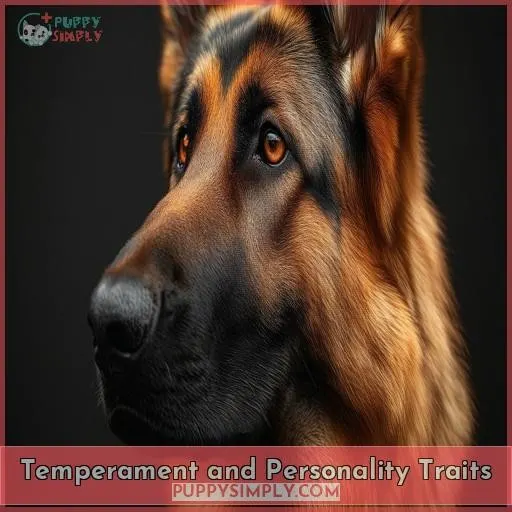This site is supported by our readers. We may earn a commission, at no cost to you, if you purchase through links.
 You’ve stumbled upon a delightful designer breed – the German Shepherd Poodle mix!
You’ve stumbled upon a delightful designer breed – the German Shepherd Poodle mix!
This hypoallergenic hybrid combines the intelligence of a German Shepherd with the low-shedding coat of a Poodle.
Expect a medium to large-sized pup, standing 22-28 inches tall and weighing 50-125 pounds.
Their wavy or curly, medium-length coat comes in shades like black, cream, or sable.
These loyal, keen-to-please companions require daily exercise and mental stimulation.
With proper grooming, training, and care, you’ll be rewarded with a devoted, hypoallergenic furry friend for 10-14 years.
But that’s just the tip of the iceberg – keep exploring to uncover more about this unique crossbreed!
Table Of Contents
- Key Takeaways
- What is a German Shepherd Poodle Mix?
- Appearance and Size
- Temperament and Personality Traits
- Grooming Requirements
- Exercise Needs
- Health Concerns
- Living Requirements
- Cost and Adoption
- Training Tips
- Are They Right for You?
- Frequently Asked Questions (FAQs)
- What is German Shepherd Poodle mix called?
- Is a German Shepherd and a Poodle a good mix?
- Is a Shepadoodle hypoallergenic?
- What does a Shepadoodle cost?
- What is the average lifespan of this hybrid breed?
- Are German Shepherd Poodle mixes good with other pets?
- How much shedding can be expected from this mix?
- Do they have any specific dietary requirements or sensitivities?
- At what age are these puppies typically ready for adoption?
- Conclusion
Key Takeaways
- Imagine a pooch with the intelligence of Einstein, the playfulness of a puppy, and the shedding tendencies of a hairless cat. That’s the German Shepherd Poodle mix for you – a hypoallergenic hybrid that’s stealing hearts left and right!
- Prepare for a whirlwind of energy with these pups. They’ll keep you on your toes with their insatiable appetite for adventure and endless reserves of enthusiasm. Better lace up those sneakers and stock up on puzzle toys!
- Easy to groom should be their middle name. With their low-shedding coats, you can kiss goodbye to lint rollers and constant vacuuming. Just a weekly brushing and an occasional trip to the groomer, and they’re ready to strut their stuff!
- These loyal companions are in it for the long haul. With a life expectancy of 10-14 years, you’ll have over a decade of wagging tails, sloppy kisses, and unconditional love by your side. Who could ask for a better deal?
What is a German Shepherd Poodle Mix?
The German Shepherd Poodle Mix – a delightful crossbreed that’s taking the dog world by storm!
Imagine the loyalty and intelligence of a German Shepherd combined with the hypoallergenic coat and affectionate nature of a Poodle. It’s a match made in canine heaven!
This crossbreed’s genetics offer the best of both worlds, giving you a loving companion with a reduced risk of triggering allergies.
With their rising popularity, these pups are becoming a sought-after choice for families and individuals alike.
From compact to standard sizes, their coats come in a variety of colors and textures, ensuring there’s a perfect fit for every household.
Get ready to embark on a world of lovable, hypoallergenic wonder with the German Shepherd Poodle Mix!
Appearance and Size
You’re in for a treat with a German Shepherd Poodle mix! These hypoallergenic pups inherit the best of both worlds – the majestic look of a German Shepherd and the curly, low-shedding coat of a Poodle.
Expect a medium to large breed, standing 22-28 inches tall and weighing 50-125 pounds. Their mixed heritage results in a wavy or curly, medium-length coat in shades of black, cream, tan, sable, or gray.
While size can vary, their appealing appearance and hypoallergenic qualities make them an alluring choice for many families.
Temperament and Personality Traits
The German Shepherd Poodle mix, with its combined heritage from two highly intelligent breeds, excels in trainability and enthusiastically learns new commands and tricks. However, potential owners should be prepared for the mix’s high energy levels, which require plenty of physical and mental stimulation through exercise and interactive playtime.
Intelligence and Trainability
Their intelligence and adaptability make them excellent for therapy work and service duties. You’ll be impressed by their loyalty, willingness to please, and trainability – true hallmarks of the German Shepherd Poodle mix. With consistent, positive reinforcement training, these hard-working ‘doodles’ thrive, showcasing their versatile temperament:
- Quick learners
- Responsive to commands
- Focused and attentive
- Willing to tackle new challenges
Energy Levels
You’ll quickly discover that these hybrids have boundless energy reserves. Daily playtime is a must – from vigorous games of fetch to brisk walks and hikes. Their intelligence craves stimulation, so indoor puzzles and training sessions offer excellent mental workouts. With proper exercise, they’re lovably goofy companions; without it, pent-up energy surfaces through destructive behaviors.
Grooming Requirements
Regarding grooming your Shepadoodle, their hypoallergenic coat necessitates attention.
With the Poodle’s low-shedding genes, you’ll likely encounter less hair around the house.
However, their wavy coat still necessitates regular brushing and trimming.
Brushing weekly will prevent mats.
Frequent bathing (every 4-6 weeks) maintains their skin’s health.
Those with sensitive skin may require a milder shampoo.
While their coat is relatively easy to manage, professional grooming every 6-8 weeks guarantees your pup’s optimal appearance.
With proper coat maintenance, your Shepadoodle’s luscious locks will remain tangle-free and allergy-friendly.
Exercise Needs
As an intelligent, energetic crossbreed, your German Shepherd Poodle mix craves an active lifestyle.
You’ll need to provide at least 60-90 minutes of exercise daily through activities like hiking, jogging, or vigorous playtime.
Mix it up with fetch, agility training, and puzzle toys to engage their sharp minds.
While apartment-friendly, they’ll be happiest with access to a yard or dog park for running and exploring.
As a potential service or therapy dog, early socialization and consistent training are key.
With proper exercise, this hypoallergenic companion will thrive as your loyal, tireless adventure buddy!
Health Concerns
When contemplating a German Shepherd Poodle mix, it’s imperative to be cognizant of the potential health concerns associated with this hybrid breed. Common issues may include hip and elbow dysplasia, bloat, allergies, and certain blood disorders, which often necessitate regular veterinary checkups and preventative care measures.
Common Health Issues
While energetic and lovable, Shepadoodles can face a few health hurdles. Brace yourself for potential concerns like:
- Hip or elbow dysplasia
- Perianal fistulas
- Tick/flea infestations
- Osteoarthritis later in life
Rest assured, reputable breeders provide health certificates and puppy vaccination records. With proper care from Southern Illinois’ top breeders near the Veterans Airport, your pup can thrive!
Life Expectancy
You’ll be pleased to learn that mixed breeds like the German Shepherd Poodle often enjoy a longer life expectancy compared to their purebred counterparts. By combining the genetic influences of two robust breeds, these lovable pups can potentially avoid some inherited health issues. With proper care, your hypoallergenic companion could be by your side for 10-14 joyful years!
Living Requirements
Are you considering adopting a German Shepherd Poodle mix and wondering about their living requirements? These intelligent, affectionate dogs can adapt well to apartment living, provided you meet their exercise needs, and they make wonderful family companions with proper socialization and training.
Good for Apartments?
While their size may make apartment living challenging, German Shepherd Poodle mixes can adapt well with proper exercise and grooming. With daily walks and playtime, their high energy levels are manageable. Regular brushing controls shedding, too. However, their barking could disturb neighbors, so training early obedience is essential for peaceful apartment coexistence.
Family-Friendly
You’ll find German Shepherd Poodle mixes make excellent family companions. They’re:
- Loyal and protective
- Patient with children
- Enthusiastic to please their owners
- Adapt well to family lifestyles
With their history as working dogs, they thrive on human interaction and bond closely with their pack. Their hypoallergenic coats and lifespan of 10-15 years make them a long-term, allergy-friendly addition.
Cost and Adoption
Regarding the cost of a German Shepherd Poodle mix, you can expect to pay anywhere from $500 to $1,500 for a puppy from a reputable breeder. Additionally, adopting from a rescue or shelter is often a more affordable option, and you’ll be giving a loving home to a dog in need.
Breeder Prices
When considering a Shepadoodle pup from a reputable breeder, you’re looking at $1800 on average. They don’t charge extra based on color or gender, and shipping quotes for puppy transportation are available if needed – but expect around $200 for that service. Just keep in mind most breeders are closed Sundays, so no Sunday pickups.
Rescues and Shelters
Rescues and shelters offer an affordable alternative to buying from breeders. You’ll pay a fraction of the cost while giving a loving home to a deserving pup. However, their availability is limited, so be prepared to:
- Act quickly when the right one comes along
- Be flexible on age, size, and breed mix
- Consider travel to meet your perfect match
With patience and an open heart, you’ll find your forever companion.
Training Tips
Training your German Shepherd Poodle mix involves positive reinforcement, patience, and consistency. Here are some tips:
- Embrace crate training for potty training and teaching your pup to stay calm when alone.
- Socialize your dog from an early age to prevent fear and aggression.
- Focus on leash training and teaching basic obedience commands like sit, stay, and come.
Their intelligence makes training rewarding, but it requires commitment:
- Short, frequent sessions keep their attention
- Use high-value treats and praise to motivate
- Be patient, as both breeds can be stubborn at times
With dedication, your furry friend will become a well-mannered, obedient companion who brings joy to your life.
Are They Right for You?
The German Shepherd Poodle mix could be your ideal canine companion if:
- You have allergies or eczema, as their hypoallergenic coat produces minimal shedding
- You lead an active lifestyle, ready to provide ample exercise and mental stimulation
- You’re prepared to address potential health issues like bloat or blood diseases
- Your home has enough space, as this energetic breed needs room to roam
- A lifespan of 10-14 years aligns with your long-term commitment
However, if you have limited time, live in a small apartment, or prefer low-maintenance pets, this high-energy mix may not suit your lifestyle. Carefully consider your circumstances to determine if you can meet their demanding needs before welcoming one into your family.
Frequently Asked Questions (FAQs)
What is German Shepherd Poodle mix called?
You’re referring to a Shepadoodle – the delightful crossbreed between a German Shepherd and a Poodle. These intelligent, keen-to-please pups blend the best traits from their parent breeds.
Is a German Shepherd and a Poodle a good mix?
A German Shepherd Poodle mix (Shepadoodle) combines intelligence and loyalty – a dynamic duo! With proper socialization and training, this crossbreed can make an excellent family companion for active households.
Is a Shepadoodle hypoallergenic?
You’re in luck! Shepadoodles are often hypoallergenic, making them a great choice for those with pet allergies. Their Poodle parentage gives them a coat that sheds minimally and produces less dander – a win for allergy sufferers seeking a furry friend.
What does a Shepadoodle cost?
You might need to loosen your purse strings a bit for this furry friend. A Shepadoodle pup typically costs around $1,800 from a reputable breeder. However, their loving nature and hypoallergenic coat make them well worth the investment.
What is the average lifespan of this hybrid breed?
You can expect a Shepadoodle to live around 10-14 years on average. This hybrid breed tends to be relatively healthy, but proper care and regular vet visits are essential for their longevity.
Are German Shepherd Poodle mixes good with other pets?
You’ll be glad to know that German Shepherd Poodle mixes generally do well with other pets, especially when introduced at a young age and properly socialized. With their friendly, intelligent nature, they can become great companions for cats, birds, or other dogs in the household.
How much shedding can be expected from this mix?
Their curly, low-shedding coats mean minimal hair around your home. You’ll enjoy their dashing looks without constant vacuuming or lint rollers required for heavy shedders.
Do they have any specific dietary requirements or sensitivities?
You’ll want to feed them a high-quality, balanced diet without too many fillers or by-products. Some have sensitivities to grains, so consult your vet about potential allergies. Proper nutrition is key for their active lifestyle.
At what age are these puppies typically ready for adoption?
Wait no longer – these pups are ready around 8 weeks old. Adopted at just the right age for smooth bonding and training, your new furry friend will seamlessly integrate into your family’s loving embrace. Prepare for a lifetime of loyalty and companionship with proper socialization from day one.
Conclusion
Seeking a devoted, low-shedding companion? Have you considered the german shepherd poodle mix? This intelligent hybrid excels at obedience training and thrives with an active lifestyle. With proper exercise, grooming, and a stimulating environment, you’ll enjoy a loyal, hypoallergenic furry friend for over a decade. So, are you prepared to discover the lovable potential of this unique crossbreed?
















